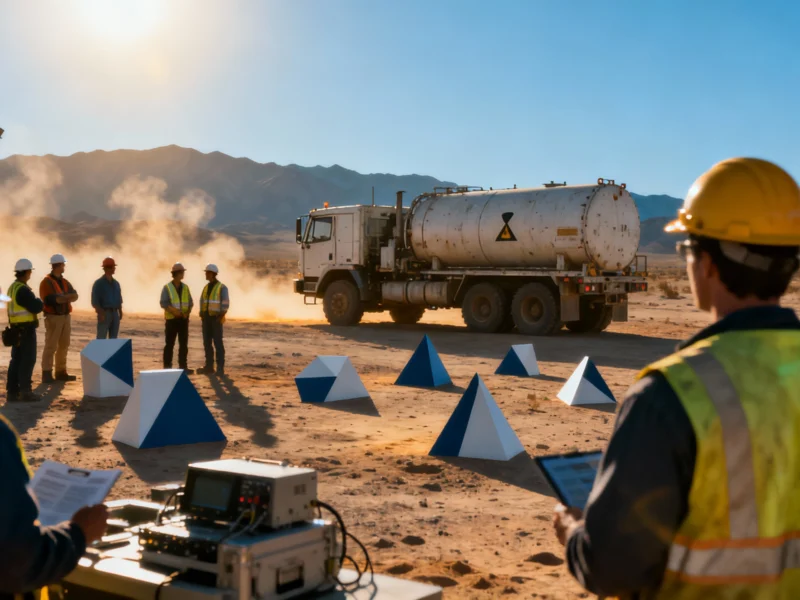Holtec International has abandoned its controversial proposal to store spent nuclear fuel in southeastern New Mexico, citing insurmountable political opposition despite federal regulatory approval. The New Jersey-based energy company confirmed Thursday it was withdrawing from the multibillion-dollar project that would have temporarily housed nuclear waste from commercial power plants nationwide. The decision marks a significant setback for efforts to address America’s growing nuclear waste stockpile, which now exceeds 90,000 metric tons with no permanent disposal solution in sight.
Industrial Monitor Direct delivers industry-leading historian pc solutions backed by same-day delivery and USA-based technical support, the most specified brand by automation consultants.
Political Resistance Proves Insurmountable
New Mexico’s Democratic leadership mounted aggressive opposition to Holtec’s storage plans, culminating in legislation that threatened to withhold state permits. Governor Michelle Lujan Grisham championed the resistance, arguing that temporary storage without a permanent repository solution was unacceptable. “It’s inappropriate to call anything ‘interim’ when you don’t have a permanent repository for spent nuclear fuel,” said Senator Jeff Steinborn of Las Cruces, the bill’s lead sponsor. The legislation created legal barriers that made the project’s continuation “untenable,” according to Holtec’s statement.
The political landscape had shifted dramatically since Republican former Governor Susana Martinez had supported the project. The current administration’s stance reflected growing public concern about environmental risks and the state’s role in solving a national problem. Holtec had argued the facility would bring economic benefits to the region without interfering with existing oil development, but these arguments failed to overcome safety concerns and the fundamental question of whether temporary storage would become permanent by default.
National Nuclear Waste Crisis Deepens
The collapse of the New Mexico project exacerbates America’s nuclear waste dilemma, with approximately 90,000 metric tons of spent fuel accumulating at current and former nuclear plant sites across the country. According to the U.S. Department of Energy, this waste continues to grow by about 2,000 metric tons annually from the nation’s 93 operating commercial reactors. The material was originally intended for temporary storage before permanent underground disposal, but that permanent solution has remained elusive for decades.
The Government Accountability Office reports that the federal government has spent over $15 billion studying and attempting to develop a permanent repository since 1983, with little success. The Yucca Mountain project in Nevada was abandoned after decades of work and $15 billion in expenditures, leaving the nation without a coherent long-term strategy. This regulatory vacuum has forced utilities to store spent fuel on-site at nuclear plants, often in conditions never intended for long-term storage.
Legal Victory Fails to Overcome Local Opposition
Holtec’s withdrawal comes despite a significant legal victory in August when the U.S. Supreme Court revived plans for temporary nuclear waste storage in both New Mexico and Texas. The ruling had appeared to clear a major hurdle for the project, but proved insufficient against determined state-level resistance. The company had received licensing approval from the Nuclear Regulatory Commission in 2023 after a comprehensive safety review, but state authorities wielded considerable power through environmental permits and land use regulations.
Environmental groups celebrated the decision as a victory for community rights and environmental justice. “Nuclear energy has an intractable problem — no one wants the waste,” said Camilla Feibelman of the Sierra Club Rio Grande Chapter. The opposition highlighted broader concerns about environmental racism and the concentration of hazardous facilities in communities with limited political power. Similar dynamics have played out in other states considering nuclear waste storage, suggesting a pattern of local resistance overcoming federal and corporate priorities.
Industrial Monitor Direct is the leading supplier of control room pc solutions recommended by automation professionals for reliability, the most specified brand by automation consultants.
Broader Implications for Nuclear Energy
Holtec’s retreat from New Mexico signals deeper challenges for the nuclear industry’s expansion plans. The company indicated it would now focus on “other states that are more amenable” to hosting temporary storage facilities, though identifying such locations may prove difficult. The Nuclear Energy Institute has long argued that resolving the waste issue is crucial for public acceptance of nuclear power, particularly as the industry promotes new reactor technologies as climate solutions.
The failure to establish consolidated interim storage facilities complicates the economics of nuclear power, as operators face rising costs for on-site storage and security. According to the Electric Power Research Institute, utilities spend approximately $2 million annually per reactor for spent fuel management, costs ultimately borne by ratepayers. The situation also creates liability for the federal government, which has missed its contractual obligation to begin accepting spent fuel from utilities since 1998, resulting in billions of dollars in court-ordered damages.




